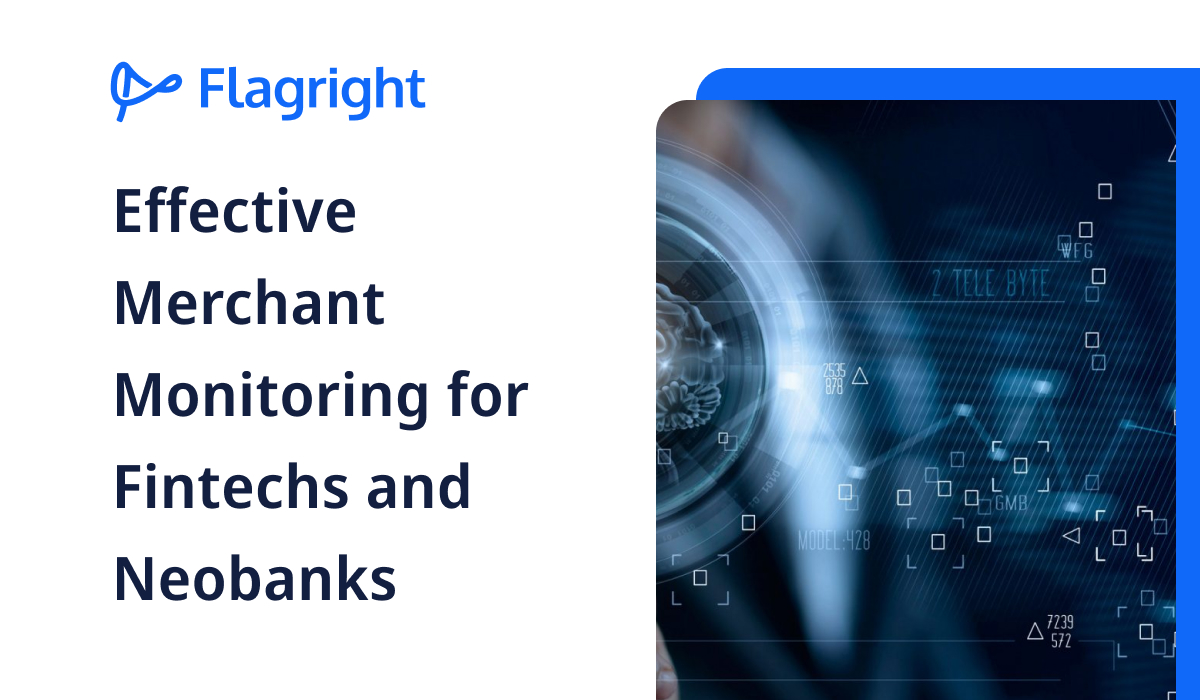Effective Merchant Monitoring for Fintechs and Neobanks
As a fintech or neobank, staying compliant with anti-money laundering (AML) regulations and protecting your business against fraud is critical to your success. One key aspect of this is merchant monitoring, which involves regularly reviewing transactions and identifying any potential risks or suspicious activity. However, merchant monitoring can be challenging for fintechs and neobanks due to their high transaction volumes, dynamic business models, and the complexity of regulatory requirements.
That's where Flagright comes in. Our centralized AML compliance and fraud protection platform offers a range of solutions, including real-time transaction monitoring, KYC and KYB verification, customer risk assessment, and sanctions screening, that make it easy for businesses to effectively monitor merchants and stay compliant.
In this article, we will discuss the link between AML regulations and merchant monitoring, challenges, benefits, and best practices to ensure effective ongoing merchant monitoring and how Flagright can help fintechs and neobanks navigate the challenges of AML compliance and fraud protection.
What is merchant monitoring?
Merchant monitoring is the process of regularly reviewing transactions and identifying any potential risks or suspicious activity. It is an important aspect of anti-money laundering (AML) compliance and fraud protection for businesses, including fintechs and neobanks.
The purpose of merchant monitoring is to identify and mitigate any potential risks of money laundering, terrorist financing, or other illicit activities. It involves reviewing & monitoring transactions, identifying and analyzing patterns of suspicious activity, and taking appropriate action to mitigate any identified risks. This may include reporting suspicious activity to the appropriate authorities, suspending or blocking transactions, or terminating business relationships with high-risk merchants.
Merchant monitoring is a continuous process that requires businesses to review transactions on a regular basis and to update their systems and processes as necessary. This is because the money laundering and fraud risks are constantly evolving, and businesses need to be able to adapt to changes in order to stay compliant and protect against fraud.
It's worth noting that merchant monitoring is not only a requirement of AML regulations but also a best practice in the industry. Thus, not only it helps businesses comply with regulations but also to protect their reputation and assets.
Understanding the link between AML regulations and merchant monitoring
AML (Anti-Money Laundering) compliance regulations play a critical role in ensuring that fintechs and neobanks effectively monitor their merchants to mitigate risks of money laundering, terrorist financing, and other illicit activities.
These regulations are put in place by government agencies such as the Financial Crimes Enforcement Network (FinCEN) in the United States and the Financial Action Task Force (FATF) internationally, and they require financial institutions to implement specific measures to prevent and detect money laundering and terrorist financing.
One of the key requirements of AML compliance regulations is the implementation of ongoing merchant monitoring. This involves regularly reviewing transactions and identifying patterns of suspicious activity. Fintechs and neobanks are required to implement systems to monitor and detect suspicious transactions, and to file Suspicious Activity Reports (SARs) and Currency Transaction Reports (CTRs) as appropriate.
Furthermore, AML compliance regulations also require fintechs and neobanks to conduct thorough due diligence on their merchants, including customer identification and verification, and to maintain records of these due diligence processes. This includes performing KYC and KYB checks, and updating them regularly, as well as screening merchants against sanctions lists.
In addition, AML compliance regulations also require fintechs and neobanks to have a robust compliance program in place. This program should include regular training for employees on AML compliance, regular independent testing and audits of the compliance program, and regular monitoring and risk assessment of the merchant portfolio.
Therefore, fintechs and neobanks must ensure they stay abreast of the evolving regulatory environment and adapt their compliance program accordingly to avoid penalties and reputational damage.
The challenges of merchant monitoring for fintechs and neobanks
Merchant monitoring is a critical aspect of AML compliance and fraud protection for fintechs and neobanks. However, it can also be a challenging task for these businesses due to several unique factors:
- High transaction volumes: One of the biggest challenges of merchant monitoring for fintechs and neobanks is the high volume of transactions they process. With a large number of transactions happening on a daily basis, it can be difficult for businesses to manually review and identify suspicious activity. This is particularly true for businesses that operate in industries with high transaction volumes, such as online payments or e-commerce.
- Dynamic business models: Another challenge for fintechs and neobanks is their dynamic business models. Fintechs and neobanks often operate in rapidly changing markets, and this can make it hard for them to keep up with evolving regulatory requirements and fraud patterns. As a result, they may not have the necessary systems and processes in place to effectively monitor merchants, which increases the risk of compliance failures and fraud.
- Regulatory complexity: Regulatory complexity is also a major challenge for fintechs and neobanks when it comes to merchant monitoring. The constantly changing regulatory landscape, and the need to comply with multiple jurisdictions and regulators, can make it difficult for businesses to effectively monitor merchants. This is particularly true for businesses that operate in multiple countries or regions, as they may need to comply with different sets of regulations and reporting requirements.
In summary, merchant monitoring is a crucial task for fintechs and neobanks, as these challenges can make it difficult for businesses to effectively monitor merchants, and increase the risk of compliance failures and fraud.
Best practices to ensuring effective merchant monitoring for fintechs and neobanks
Ensuring effective merchant monitoring is essential for fintechs and neobanks to effectively comply with AML regulations and protect against fraud. Here are some steps that businesses can take to ensure proper ongoing merchant monitoring:
- Establish clear policies and procedures: Establishing clear policies and procedures for merchant monitoring is the first step towards effective ongoing monitoring. These policies and procedures should detail the process for reviewing transactions and identifying potential risks, as well as the procedures for taking appropriate action to mitigate identified risks.
- Implement automated systems: Automated systems can help businesses more effectively review transactions and identify potential risks. These systems can include transaction monitoring software, which can automatically flag suspicious transactions for review, or customer risk assessment tools, which can help businesses evaluate the risk of fraud or money laundering associated with specific merchants.
- Regularly review and update policies and procedures: Policies and procedures for merchant monitoring should be regularly reviewed and updated to ensure that they are keeping pace with changes in regulations and fraud trends.
- Train employees: It's important for businesses to provide training for employees on merchant monitoring policies and procedures, including how to identify and report suspicious activity.
- Regularly assess risk: Businesses should regularly assess the risk of money laundering, terrorist financing, or other illicit activities associated with their merchants and transactions. This will help them identify and prioritize areas of high risk, so they can take appropriate action to mitigate those risks.
- Monitor and track progress: Businesses should monitor and track the progress of their merchant monitoring program. This can be done by regularly reviewing metrics such as the number of suspicious activities reported and the number of suspicious activities that were subsequently confirmed.
The benefits of merchant monitoring for fintechs and neobanks
Merchant monitoring is essential for fintechs and neobanks to effectively comply with AML regulations and protect against fraud. Here are some of the key benefits of merchant monitoring:
- Identifying and mitigating risks: Merchant monitoring allows businesses to identify and mitigate potential risks of money laundering, terrorist financing, and other illicit activities. By regularly reviewing transactions and identifying patterns of suspicious activity, businesses can take appropriate action to mitigate identified risks.
- Staying compliant with regulations: Merchant monitoring is a critical aspect of AML compliance. By regularly monitoring merchants and transactions, businesses can ensure that they are complying with regulatory requirements and industry best practices.
- Protecting against fraud: Merchant monitoring also helps businesses protect against fraud. By identifying and mitigating potential fraud risks, businesses can reduce the likelihood of fraudulent activity occurring and minimize the potential impact of any fraud that does occur.
- Enhancing customer trust: By effectively monitoring merchants and protecting against fraud, businesses can enhance customer trust and confidence in their services.
- Improving operational efficiency: Merchant monitoring can also help businesses improve their operational efficiency by automating the process of reviewing transactions and identifying potential risks.
- Saving costs: By identifying and mitigating potential fraud and compliance risks, businesses can save costs that would have been incurred due to fraud and penalties for non-compliance.
In conclusion
Merchant monitoring is essential for fintechs and neobanks to effectively comply with AML regulations and protect against fraud. With Flagright, fintechs and neobanks can effectively monitor their merchants and transactions to mitigate the risks of money laundering, terrorist financing, and other illicit activities.
Furthermore, Flagright solutions are designed to save businesses time and money by automating compliance processes, reducing false positives, and providing actionable insights. With these, fintechs and neobanks can rest assured that they are compliant with regulations and protected against fraud.
If you're a fintech or neobank looking to effectively monitor your merchants and stay compliant with regulations, schedule a free demo with Flagright today and see how our solutions can help you achieve your goals.

















.webp)











